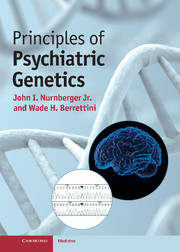
- Cited by 3
-
Cited byCrossref Citations
This Book has been cited by the following publications. This list is generated based on data provided by Crossref.
Al Eissa, Mariam M. Fiorentino, Alessia Sharp, Sally I. O'Brien, Niamh L. Wolfe, Kate Giaroli, Giovanni Curtis, David Bass, Nicholas J. and McQuillin, Andrew 2018. Exome sequence analysis and follow up genotyping implicates rare ULK1 variants to be involved in susceptibility to schizophrenia. Annals of Human Genetics, Vol. 82, Issue. 2, p. 88.
Rudibaugh, Thomas P. Tam, Ryan W. Estridge, R. Chris Stuppy, Samantha R. and Keung, Albert J. 2024. Single-Cell Assessment of Human Stem Cell-Derived Mesolimbic Models and Their Responses to Substances of Abuse. Organoids, Vol. 3, Issue. 2, p. 126.
Völker, Jes Sebastian Micluția, Ioana Valentina and Hanga, Adela-Melania 2024. Current State of Application of Formal Thought Disorder Screening Methods in First-Degree Relatives of Patients With Schizophrenia: A Narrative Review. Current Psychiatry Research and Reviews, Vol. 20, Issue. 2, p. 106.
- Publisher:
- Cambridge University Press
- Online publication date:
- October 2012
- Print publication year:
- 2012
- Online ISBN:
- 9781139025997

